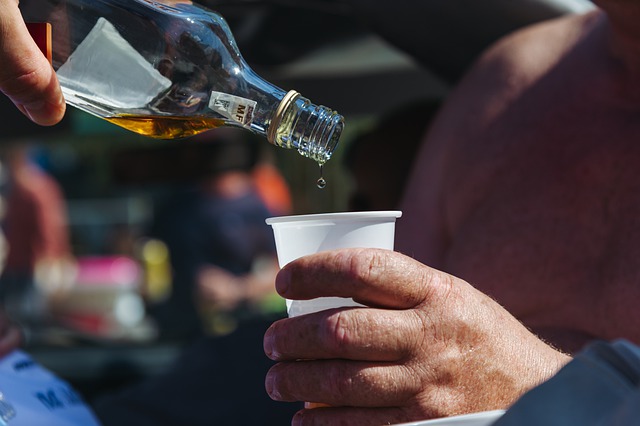If you’re over 21, it’s not unusual to enjoy an alcoholic beverage from time to time. But as you age, alcohol can affect you differently than it did in your younger days. While most health professionals would agree that drinking should be kept to a minimum, the question remains if people over 70 should drink alcohol at all?
Do People Over 70 Drink Alcohol?

Image by Kasjan Farbisz from Pixabay
Yes, some people over 70 do drink alcohol, while others do not. It ultimately depends on the individual’s personal choices and habits. According to the CDC, individuals over 65 years of age are the least likely to binge drink of any other age group. While seniors may drink less than other age groups, they still do in-fact drink.
Top Reasons Seniors Drink Alcohol
There can be various reasons why seniors might choose to drink alcohol. Certain social activities or lines of work may present more opportunities to drink, as may prolonged isolation. Some of the top reasons seniors drink alcohol include:
- Socialization: Drinking alcohol can be a way for seniors to socialize with friends and family, especially if they live alone or in a retirement community.
- Relaxation: Alcohol can help some seniors to relax and unwind after a long day or to cope with stress or anxiety.
- Tradition: Some seniors may have grown up in a time when drinking was more socially acceptable, and they may continue to view alcohol as a normal part of social occasions.
- Medical issues: Some seniors may use alcohol to self-medicate for physical or mental health issues, such as chronic pain or depression.
- Boredom: Without the same level of activity, engagement, and exercise as they had when they were younger, some seniors may turn to alcohol as a way to fill their time.
It’s worth noting that excessive drinking can lead to a range of negative health consequences, including increased risk of injuries from falls, liver disease, and cognitive decline. It’s important for seniors to talk to their healthcare provider about their alcohol consumption.
Should People Over 70 Drink Alcohol?

Image by Darko Stojanovic from Pixabay
Whether or not people over 70 should drink alcohol depends on their individual health status and habits. While moderate alcohol consumption may have some potential health benefits for some seniors, excessive drinking can have negative effects on health, particularly as people age.
As people age, their bodies become less efficient at processing alcohol, so consuming alcohol can have greater negative effects on their health than it might have had when they were younger. Therefore, older adults are generally advised to drink alcohol in moderation, if at all.
The U.S. Dietary Guidelines for Americans recommend that adults over age 21 who choose to drink alcohol do so in moderation, which means up to one drink per day for women and up to two drinks per day for men. However, this recommendation may not be appropriate for everyone, and individuals should talk to their healthcare provider about whether or not it’s safe for them to drink alcohol based on their personal health status and any medications they may be taking.
RELATED: Common Injuries Among the Elderly
How to Help A 70+ Year Old Senior Stop or Reduce Alcohol Consumption

Image by Sofie Zbořilová from Pixabay
Helping a senior stop drinking can be a challenging process, and it’s important to approach the situation with sensitivity and empathy. Here are some steps that can be taken to help a senior who may be struggling with alcohol abuse:
- Express concern and support: It’s important to approach the senior with concern and support, rather than judgment or criticism. Let them know that you care about their health and wellbeing and that you are there to support them in making positive changes.
- Encourage professional help: Encourage the senior to seek professional help from a healthcare provider, addiction specialist, or mental health professional. They can provide support and guidance on how to manage alcohol withdrawal symptoms, as well as how to develop a plan for long-term recovery.
- Offer alternative activities: Encourage the senior to engage in alternative activities that do not involve alcohol. This could include taking up a new hobby, exercising (senior yoga is a great option), or spending time with family and friends.
- Provide a safe and supportive environment: Make sure that the senior is in a safe and supportive environment that is conducive to recovery. This may mean removing alcohol from the home or avoiding social situations where alcohol is present.
- Stay involved and supportive: Recovery from alcohol abuse can be a long and challenging process, so it’s important to stay involved and supportive over the long term. Encourage the senior to attend support groups or to continue seeing a healthcare or mental health professional, and provide ongoing encouragement and support as they work toward recovery.
Who can Help With Senior Alcohol Addiction?
If you are currently seeking help for a senior with alcohol addiction, there are several resources available. Depending on your region and level of need, consider the following options to help seniors struggling with alcoholism…
Healthcare provider: A healthcare provider, such as a doctor or nurse practitioner, can provide support and guidance on how to manage alcohol withdrawal symptoms, as well as how to develop a plan for long-term recovery.
Substance abuse treatment center: Substance abuse treatment centers can provide a variety of services, including detoxification, counseling, and support groups. Some treatment centers specialize in working with seniors and may offer specialized programs and services tailored to their unique needs.
Alcoholics Anonymous (AA): AA is a well-known support group that provides support and guidance to individuals struggling with alcoholism. Many AA meetings are open to people of all ages, including seniors.
National Council on Alcoholism and Drug Dependence (NCADD): The NCADD is a nonprofit organization that provides information, resources, and support to individuals struggling with alcohol and drug addiction. They may be able to provide referrals to local treatment centers and support groups.
Area Agency on Aging (AAA): AAAs are organizations that provide a range of services to seniors, including information and support on issues related to alcoholism and substance abuse.
It’s important to remember that recovery from alcoholism is a challenging process, and it’s important to seek out professional help and support.
*This article contains partial AI-generated content
Sandyside Senior Living
This information was provided by Sandyside Senior Living in White Lake, Michigan. Sandyside specializes in advanced care for seniors with dementia, Parkinson’s, and all age-related illness.
Interested in learning more about Sandyside Senior Living? Contact Sandyside online, or call at (248) 698-3700.
To get in touch with Sandyside Senior Living please complete the form below:
VISIT SANDYSIDE SENIOR LIVING TODAY
PHONE: (248) 698-3700


